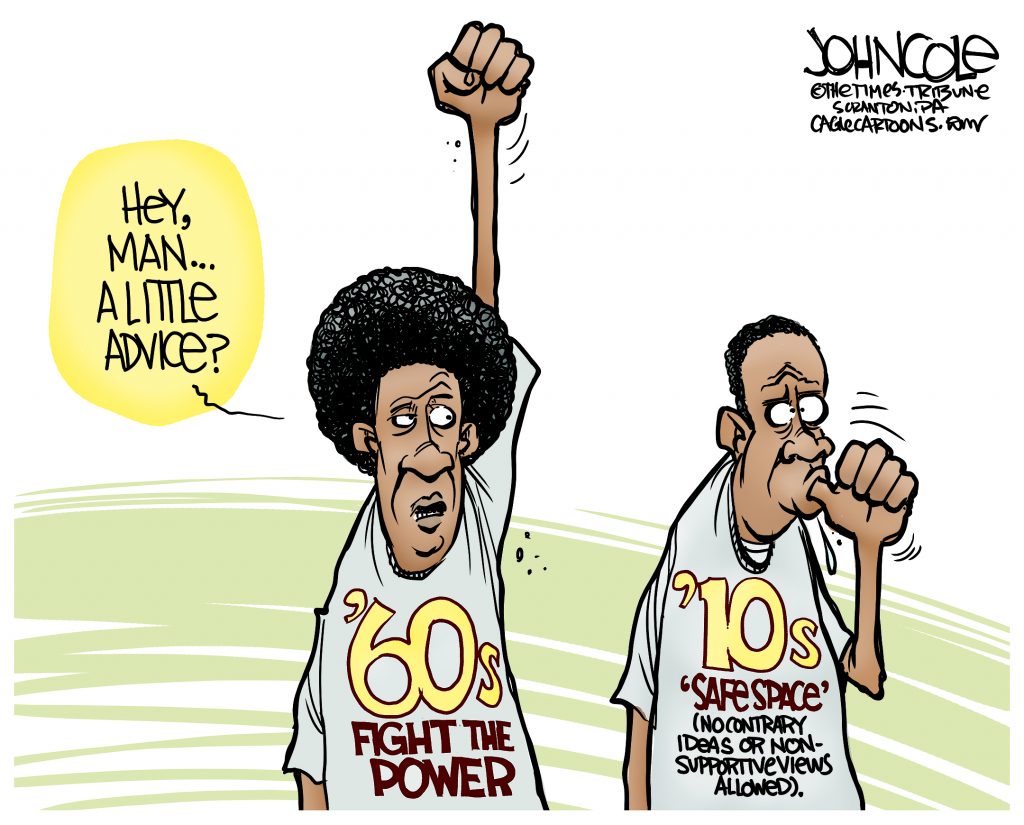
John Pavlovitz, the blogger/pastor behind “Stuff That Needs To Be Said” first came to my attention when a Facebook friend shared his January 2017 “Let the Record Show…” post in response to Trump’s election. I read it out of interest and respect for my friend. Plus, at first blush, it looked intriguingly over the top.
Some days I wish I hadn’t. John Pavlovitz’s post is a thoroughly overwrought partisan political piece of poo for which I can only attribute my friend’s sharing it to severe post-election angst. Curious, I visited Pavlovitz’s Facebook page. After a few months of reading his posts and interacting with him and his followers, I’ve come to these conclusions:
1) He doesn’t genuinely engage those who challenge him, but instead replies reactively with childish taunts of trolling and shutdowns rather than defending his positions.
2) He’s so angry over the Trump presidency and with those who support him that he employs emotionally overcharged comparisons and tactics to oppose them (Trump is a terrorist; GOP wants to deprive poor people of health care; Christians hate LGBTQ folks).
3) He’s drunk with his own social media popularity and views it as a validation for the liberal, emergent church-based theology that got him fired from a pastor gig.
I don’t care much about his political postings on his website and social media pages, but I care very deeply that he mangles scriptural truth and misrepresents Jesus in order to weaponize him.
Pastoral panache
Pavlovitz tries to lend credibility to his political (and spiritual) attacks on Trump, Republicans, “Evangelical” Christianity and 2,000 plus years of accepted theology by citing years of pastoral experience.
In his roles as pastor in “the resistance” and “social justice warrior,” he resists an illegitimate and odious president and the evil evangelicals who support(ed) him. And while he’s at it, he champions the marginalized (as defined by his Democratic party).
I pray for Pavlovitz. And for some reason I feel a kinship—maybe because of our similar ethnic backgrounds/former Catholicism. Or maybe something about his idealism and passion makes me feel for him because he’s chasing his tail by mistaking political activism for spiritual mission.
Speaking of the spiritual, Pavlovitz doesn’t seem to understand Jesus at all. To him, he’s all love, all the time. Of course, Jesus is love. How can he not be—he allowed himself to be tortured and crucified in order to take the sins of the world literally on his back. Because he loves, he died for us, but he’s so much more than merely love: He’s the Lamb of God and the Lion of Judah.
Lion and lamb
As C.S. Lewis’ Lucy in The Chronicles of Narnia asks and learns of Aslan (Jesus):
“Is—is he a man?” asked Lucy.
“Aslan a man!” said Mr. Beaver sternly. “Certainly not. I tell you he is King of the wood and the son of the great Emperor-Beyond-the-Sea. Don’t you know who is the King of Beasts? Aslan is a lion—the Lion, the great Lion.”
“Ooh!” said Susan, “I’d thought he was a man. Is he—quite safe? I shall feel rather nervous about meeting a lion.”
“That you will, dearie, and no mistake” said Mrs. Beaver, “if there’s anyone who can appear before Aslan without their knees knocking, they’re either braver than most or else just silly.”
“Then he isn’t safe?” said Lucy.
“Safe?” said Mr. Beaver. “Don’t you hear what Mrs. Beaver tells you? Who said anything about safe? ‘Course he isn’t safe. But he’s good. He’s the King, I tell you.”

Pastor Pavlovitz doesn’t write about Jesus as Savior, Lord and King. He writes of him as his standard for social justice. To justify his attacks, he assumes a self-appointed role as temple table over-turner and compares his angry rants to Jesus’ outrage over merchants’ peddling their wares in the temple of his “Father’s house.”
In Pavlovitz’s view, Jesus is only dangerous to John’s perceived political enemies. Instead of seeing him as Savior, he sees him as merely a model for social activism. Pavlovitz seems to repudiate Jesus’ loving sacrifice and willing atonement because both do not fit his desired perception of God.
Messy is the new sin
It seems that Pavlovitz prefers a loving Jesus who doesn’t hold us to any standards other than that we “fight” for “the marginalized.” Instead of acknowledging sin and our fallen nature, Pavlovitz propagates the emergent church’s version of sin as a “messiness.”
What does that even mean? Okay, we’re messy, but why? What causes us to live messy lives? What drives us to murder, steal, kill, cheat and commit a world of other messy sins against each other?
Pavlovitz fails to acknowledge the source of evil and rejects sin by turning it into an amorphous and innocent messiness. Instead of following Jesus by taking him at his word, acknowledging a universal, self-evident truth that we are broken because of our propensity to sin, helping others embrace a loving, sinless and holy Savior, he rejects the very reason Jesus became a man, lived a sinless life, and died so that we might live.
To Pavlovitz, Jesus is less a savior and more a slingshot to slay his giants. And though he writes about mercy, he only expresses it toward those he and his party consider marginalized. He doesn’t seem to understand mercy’s ultimate expression nor does he accept our need for it in response to a holy God.

Real mercy
Consider Jesus’ parable of the unmerciful servant who owed his master 10,000 talents, the equivalent of 160,000 years of wages (as one talent was worth 16 years of wages). This would be like a $60k per year employee owing his employer $9,600,000,000. Obviously, neither debt could ever be paid.
By law, the servant could be given life in debtor’s prison. But because of his tears and please for mercy, his master’s heart was touched and he forgave the servant all he owed. The staggering debt was wiped out with mercy.
God’s mercy wipes clean ledgers and settles accounts. It dissolves debt and saves those whose hearts are open, tender, and penitent. His mercy is powered by love. And it’s the essence of grace. Mercy is something Pavlovitz says he feels and shows to others who are politically marginalized, but how can he when he doesn’t accept it from God?
It’s easy to write about loving others, but I don’t see any hope in Pavlovitz’s posts about death. Nor do I see any love in his obsessive attacks on Trump. Nor in his incessant attacks on other believers. We’re all sinners, but if Pavlovitz doesn’t believe in sin, how can he see himself as one? And if he believes that truth is something one feels is right for him or her—even when one’s truth is diametrically opposed to another’s truth, how can truth be true?
Stuff that truly needs to be said
Here’s an unavoidable truth: We simply cannot do enough or be good enough to atone for our sins and sinfulness. If we could, Jesus died for nothing. HE is the only one good enough to atone for our sins, and He did so out of love and mercy.
Some people are like the unmerciful servant (sinner) who failed to show mercy to his fellow servant (and fellow sinner), but instead had him thrown into debtor’s prison because he owed him next to nothing (a single day’s wages)—and this AFTER having been forgiven of his staggering debt. It shows that he didn’t have the slightest concept of mercy, but instead was a grasping, greedy, graceless person.
I don’t think Pavlovitz is like this. I use this parable as a way to illustrate God’s wonderfully loving and forgiving mercy and grace—a concept that I struggled with as a cradle Catholic for years (and still do so a little). I had the toughest time viewing God as a loving, forgiving, smiling, merciful Father-God who loves me no matter how much I disappoint Him. But my struggle makes me appreciate His loving mercy all the more.

God as child abuser
From Pavlovitz’s words, it seems that instead of embracing God’s love and mercy, he has embraced this lie: If God allowed or appointed his own Son to die and atone for our sins, he is guilty of “child abuse.” This is a humanization and rejection of God’s perfect nature. And it’s a favorite justification of emergent church leaders for their (only) loving (yet politically progressive) Jesus.
For the life of me, I can’t understand why a just, loving, perfect God is so repugnant to them. We want our judges to be just arbitrators of the law and issue just verdicts. We want parents to establish boundaries of behavior and hold their children accountable for their actions. I’m confident that Pavlovitz is a good father who has standards of behavior for his children. Here’s my question to him: Why wouldn’t a much better (perfect) Heavenly Father have standards for us?
God’s standards derive from his perfection and are for our good. His mercy flows from his love for us (like any good father for his children). And His grace, through his Son’s willing and loving sacrifice, covers our sins. What a beautiful love story. What an amazing grace.
Amorphous grace
Sadly, Pavlovitz, like the unmerciful servant, doesn’t seem to understand our need for God’s grace. Not because he’s grasping and greedy, but because he’s graceless. And he’s graceless not because he writes that way, but because he lives without God’s grace.
For Pavlovitz to accept God’s grace means that he must accept that He is holy. And to accept this means he must accept the necessity of Jesus’ sacrifice for our sins in order to satisfy this holiness. And because he has humanized God, he no longer sees Him as holy. He has lowered God in his mind by rejecting his nature and replacing it with one that he can accept.
Pavlovitz has also replaced Jesus’ Great Commission (sharing God’s mercy and grace with others) with a Captain Ahabesque obsession and silly “resistance” to a foolish president. This is like trading a diamond field for a dunghill. And this is the difference between living life with forever in mind and settling for the vanity of the here and now.
What I mean by vanity is what Solomon (the man to whom God gave the gift of wisdom) meant by it: Anything we strive for in this life that—compared to God’s plan of redemption and eternity—is valueless and a waste of time. Vain pursuits distract us from truly loving others and from sharing God’s mercy and grace.
Picking the wrong fight
I’m not saying that we shouldn’t fight for the marginalized. Faithful Christians (and non) hid Jews during the holocaust and defied an evil tyrant. But they also did so without losing sight of the ultimate plan. Can we agree that someone’s eternal soul is more important than a tax reform or an immigration ban?
Pastor Dietrich Bonhoeffer defied Hitler not with snarky words about his hair or heart, but with a rock-solid adherence to truth and resistance borne of faith, not fantasy. Bonhoeffer was part of a real resistance to a genuine evil. He didn’t play politics; he played for keeps and died for embracing truth and resisting genocide.
Compare Pastor Bonhoeffer’s mission and sacrifice to Pavlovitz’s:
One was a pastor who died for his faith; the other is a poser who peddles politics to the faithless. One sacrificed everything to stand against true evil; the other plays political pastor in a wannabe resistance. One was imprisoned and executed for fighting genocidal fascism; the other suffers with ideological fear and anguish brought on by a presidential election defeat.
Pastor in a resistance? Pavlovitz wouldn’t know a real reason to resist unless it kicked him in the teeth.

Fighting the right fight
Instead of joining a worthy fight against a real enemy—the one who’s behind genuine evil—I’ll say it: the devil, Pavlovitz dismisses his existence while branding a buffoon of a president evil. He can’t have it both ways. If evil exists, and I think most agree that it does, from whom does it come? If Trump is evil, is he evil on his own? Can Trump be stupid, as Pavlovitz asserts, and also a diabolical genius who is the source of his own evil? How can a dumb schmuck like Donald pull his own strings?
Witness the glaring lack of logic in Pavlovitz’s positions: He’s sees bogeymen in the oval office and behind pulpits, not because he’s illogical, but because he’s blinded by a partisan political frenzy of anger and fear.
Meme crazy
Here’s a prime example of Pavlovitz’s arrogance and delusion. From a recent meme on his Facebook page titled, Cultivating the Activist Heart of Jesus:
“When professed Christians call me a ‘social justice warrior,’ as if I’m supposed to be insulted, I just ask them to read the gospels to see who I’m taking my cue from.”
Let’s break it down.
First, Pavlovitz’s use of the word “professed” connotes hypocrisy. It implies that if a Christian disagrees with his take on Jesus as social justice warrior, he or she has not properly read the gospels.
Second, he assumes that Christians who call him a social justice warrior mean it as an insult rather than as a misapplication of his gifts. Everything is a petty fight to him. His snarky social media style resembles an arrogant teenager rather than a mature adult … or pastor.
Third, Pavlovitz ignores the real enemy and instead makes enemies of Christians because he conflates their opposition to his mangling of truth with political opposition of conservatives and republicans to his progressive positions.
Dear John,
Social justice is political, not spiritual. Jesus is the King of kings and Lord of lords, not a party pawn like you. His justice is over sin and death; it’s not consumed with presidents and politics.
Don’t try to lower Jesus Christ to the level of your ridiculous resistance and identity politics. And no, pastor—the gospels do not back you up, and the only cues you’re taking are yours.
I’m a Christian and have the read the gospels. Nowhere in any of them do I see a Jesus who acts or speaks like you. I see a Jesus whose words beautifully transcend ugly politics, supposed social justice and an us-versus-them war of words and stuff-than-needs-to-be-said ego trip.
I see a Jesus whose mission is essential and profound and not all like your silly social media rampages. Jesus is after hearts and souls; you’re chasing likes and shares. You aren’t taking any cues from Jesus; you’re taking them from your own deluded and deceived heart.
Questions
Let’s think this through:
If God is God, is he sweating a Trump presidency? If He’s God, does he applaud Pavlovitz’s obsessive vilification of another sinner? Does God think a political party’s platform involving social justice is more important than his plan of ultimate justice and universal atonement?
Do you think God approves of this aspect of Pavlovitz’s party’s platform—that killing unborn babies is okay? This is another issue, but it illustrates a colossal contradiction of his social warrior mantra of fighting for the least of these.
I’ve read too many of Pavlovitz’s political rants and attacks and can’t imagine any of them coming out of Jesus’ mouth or with his approval. I think Jesus would say what he said to one of the disciples when they wanted him to lead the resistance against Roman rule, and I paraphrase:
There will come a time when I’ll return to set all things right, but it isn’t now, and it’s not in the way you want or think. I’ve come to lay down my life, not take up a sword.
Mad man
Pavlovitz is a former advertising art director. This is another similarity between us—we’ve both worked in advertising, which is why I know that he knows how to get clicks with his blog, Facebook and Twitter posts. I can also tell by the graphic quality of his memes. His wife is also an art director.
There’s nothing wrong with knowing how to get clicks. And there’s nothing wrong with applying one’s artistry to create quality messaging. Here’s where John goes wrong, in a nutshell:
Pavlovitz creates posts, comments and memes in order to “resist” Trump, Republicans and Evangelical Christians because he thinks they threaten all that is good, right and fair in the world. Are there Evangelical leaders who shouldn’t be? Of course. Rotten Republicans? You bet.
But there are also progressive pseudo-Christians and dirty Democrats—like Pavlovitz’s golden girl, Hillary. How about a bit of balance and reality, pastor? Better yet—how about joining the real resistance?
A Christian’s enemies are the world, the flesh, and the devil. Pastor Pavlovitz’s are Trump, Trump, and Trump. Or to be more accurate—Trump, evangelicals who voted for Trump, and GOP members who voted for Trump.
The truth is that Pavlovitz’s bogeymen threaten the goals and ideology of his political party and emerging church dogma. But they simply are not the monsters he portrays them to be.
Marketing minister
Pavlovitz wages his holy war by blending hatred and passion with advertising and marketing methods to caricature his perceived enemies. He does so by creating false equivalencies, straw men, silly exaggerations and outright lies while pushing a political agenda and his career as a writer and pastor in “the resistance.”
Pavlovitz is not acting as a pastor; he’s acting as a political activist. He touts his ministry experience to lend weight to his work, but as he likes to write (and as Jesus said): We can know people’s hearts by their fruit.
So be it. John Pavlovitz’s fruit can seem fresh and needful, but it’s gratuitous and rotten because it issues from a heart poisoned with fear, hate and politics. It’s absurdly over the top and unworthy of thoughtful discussion.
Stuff that needs to be said? Not so much.










